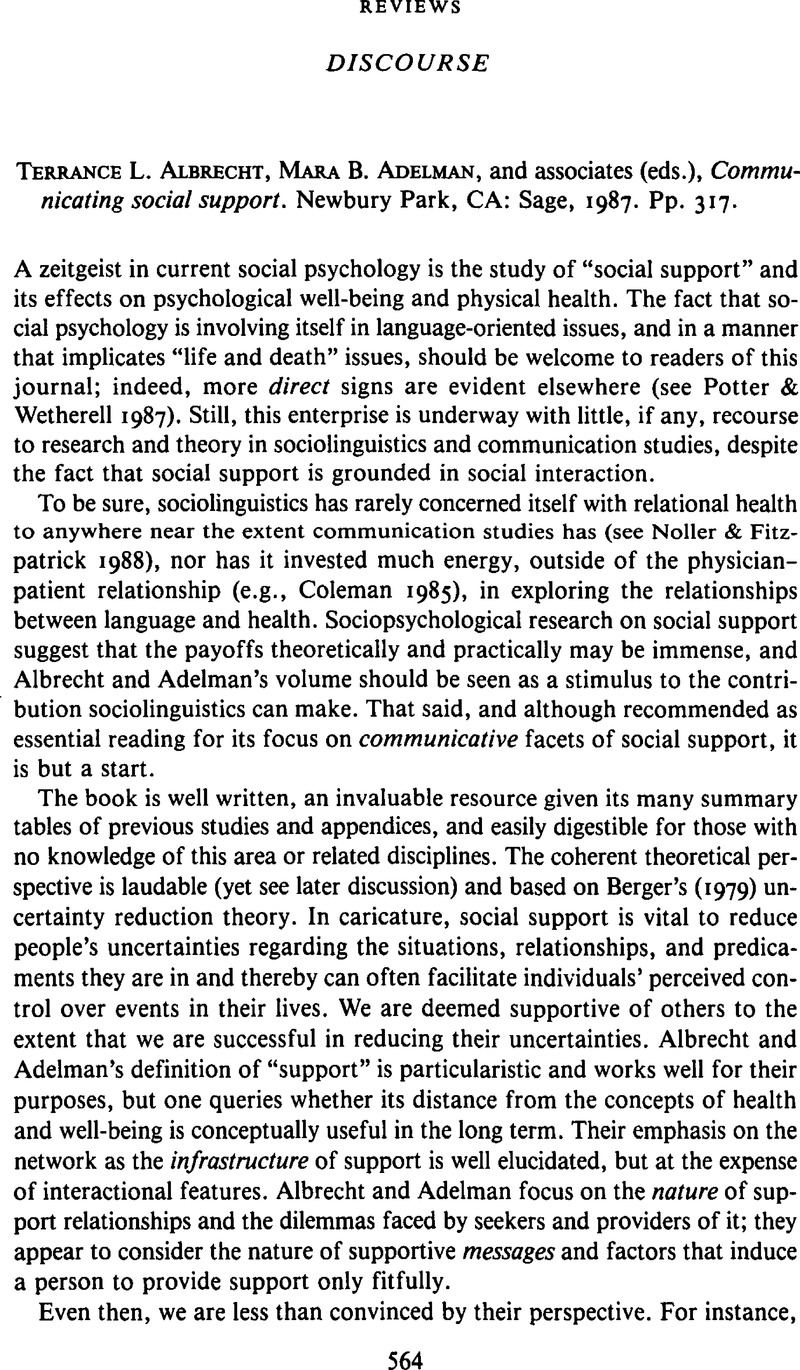No CrossRef data available.
Article contents
Discourse - Terrance L. Albrecht, Mara B. Adelman, and associates (eds.), Communicating social support. Newbury Park, CA: Sage, 1987. Pp. 317.
Published online by Cambridge University Press: 18 December 2008
Abstract
An abstract is not available for this content so a preview has been provided. Please use the Get access link above for information on how to access this content.

- Type
- Book Review
- Information
- Copyright
- Copyright © Cambridge University Press 1990
References
REFERENCES
Albrecht, T. L., & Adelman, M. B. (1984). Social support and life stress: New directions for communication research. Human Communication Research 11 (1):3–32.Google Scholar
Berger, C. R. (1979). Beyond initial interaction: Uncertainty, understanding, and the development of interpersonal relations. In Giles, H. (ed.), Language and social psychology. Oxford: Blackwell. 122–44.Google Scholar
Berger, C. R., & Calabrese, R. J. (1975). Some explorations in initial interaction and beyond: Toward a developmental theory of interpersonal communication. Human Communication Research 1:99–112.Google Scholar
Burleson, B. R. (1985). The production of comforting messages: Social-cognitive foundations. Journal of Language & Social Psychology 4(3/4):253–73.Google Scholar
Coleman, H. (ed.) (1985). Language and work 2: The health professions. International Journal of the Sociology of Language 51:105–129.Google Scholar
Coupland, J., Coupland, N., Giles, H., & Wiemann, J. (1988). My life in your hands: Processes of disclosure in intergenerational talk. In Coupland, N. (ed.), Styles of discourse. London: Croom Helm. 201–53.Google Scholar
Coupland, N., Coupland, J., & Giles, H., & Henwood, K. (1988). Accommodating the elderly: Invoking and extending a theory. Language in Society 17 (1):1–41.Google Scholar
Coupland, N., Henwood, K., Coupland, J., & Giles, H. (1988). Accommodating troubles-talk: The management of elderly self-disclosure. In McGregor, G. (ed.), Reception and response: Hearer creativity and the analysis ofspoken and written texts. London: Croom Helm.Google Scholar
Dryden, C., & Giles, H. (1987). Language, social identity, and health. In Beloff, H. & Coleman, A. (eds.), Psychology survey 6. Leicester: British Psychological Society. 115–39.Google Scholar
Kobasa, S. C. O., & Pucetti, M. C. (1983). Personality and social resources in stress resistance. Journal of Personality & Social Psychology 45 (4):839–50.Google Scholar
Lehman, D. R., Ellard, J. H., & Wortman, C. B. (1986). Social support for the bereaved: Recipients' and providers' perspectives on what is helpful. Journal of Councelling & Clinical Psychology 54 (4):438–46.Google Scholar
Noller, P., & Fitzpatrick, M. A. (eds.) (1988). Perspectives on marital interaction. Clevedon: Multilingual Matters.Google Scholar
Sunnafrank, M. (1986). Predicting outcome value during initial interactions: A reformulation of uncertainty reduction theory. Human Communication Research 13 (1):3–33.Google Scholar
Tajfel, H., & Turner, J. C. (1979). An integrative theory of intergroup conflict. In Austin, W. G. & Worchel, S. (eds.), The social psychology of intergroup relations. Monterey, CA: Brooks/Cole. 33–47.Google Scholar




